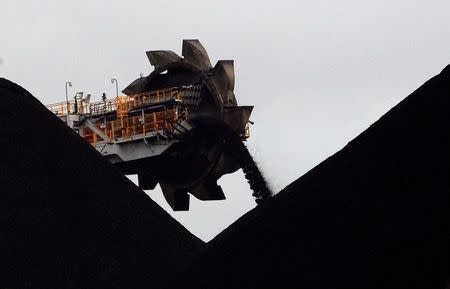Coal: After the surge, how low can it go?
By Henning Gloystein SINGAPORE (Reuters) - A wave that has lifted some coal prices to more than double in the last six months may be about to ebb away, turned back by China's move to loosen the restrictions on domestic mining that first triggered the fuel's rise. Australian Newcastle cargo prices, Asia's benchmark, have fallen 7.8 percent in November already, slipping to $105.75 per tonne from almost $115 at the start of the month, their highest since 2012. On Thursday, China's state planner moved to ease production curbs ahead of peak winter demand for heating fuels, allowing mines 54 more working days a year. It was a Beijing move earlier this year to cap domestic mining to cut excess capacity that had triggered coal's rise as utilities in the region, especially in South Korea and Japan, began to stock up. "The strong pricing rebound since early 2016 is unlikely to be sustained as the Chinese government relaxes its working-day curtailment policies to manage prices," Fitch Ratings said in a note to clients. "Going forward, much will now depend on the weather outlook in northern Asia, where the peak demand winter season has just started. Overall I think this will be a bumpy winter price ride" said a trader with a commodity shipper. The winter outlook for China and South Korea is for unusually cold weather into December, although the outlook for Japan is more within the seasonal norms, meteorological data in Thomson Reuters Eikon showed. "As China said it would increase production, prices are down. Besides that, demand has also declined because most (utilities) have procured their winter supplies," said a source with a South Korean utility. Asia's coal market rally has been unprecedented and gave miners an unexpected boon in a sector that has been otherwise dogged by years of slump and decline. OVERBLOWN, BUT NOT UNWARRANTED Analysts said that the recent spike was somewhat overblown, and a downward correction therefore necessary. But they said prices would unlikely fall back to pre-rally levels. "China's domestic benchmark thermal coal price is sustainable at 515 yuan per tonne in the medium term, and equates to a benchmark Newcastle thermal coal price of $73 per tonne FOB (free on board)," energy consultancy Wood Mackenzie said in a study published this week. A price of slightly above $70 a tonne for prompt coal cargoes would be more in line with financial futures. Benchmark European API2 2017 coal futures have fallen over 10 percent this month, to a last close of $69.70 per tonne, its lowest since late October. Europe's API2 also more than doubled in recent months, pushed by nuclear power outages and relatively low renewable output, but a balanced supply and demand outlook has helped rein in prices there too. A coal price in the $70s per tonne is something miners would likely be able to live with, as most have production costs below that level, industry data shows. Rory Simington, principal mining and metals analyst at Wood Mackenzie, said China's policymakers would likely support prices above recent lows. This would "provide a much more positive outlook for a sector that has been under much pressure of late", Simington said. Glencore, the world's biggest thermal coal exporter, which laboured through almost half a decade of falling prices prior to the recent spike, said it has an average production cost of about $37 a tonne for its supplies. ($1 = 6.8685 Chinese yuan renminbi) (Reporting by Henning Gloystein; Additional reporting by Jane Chung in SEOUL; Editing by Kenneth Maxwell)



